We were lucky enough to have Hoai-Nam Bui, a 3rd year student at Macalester College in St. Paul, Minnesota studying geology and biology join us at the Institute for a week. We first met at the Sea Semester event in March 2020. Below is Hoai-Nam’s reflections on her travels round New Zealand.
This past week, I have been given the incredible opportunity to work with the McGuinness Institute and experience everything that goes into the running of a successful workshop, specifically ForesightNZ. This experience was preceded by a visit to the Institute in late March, when my study abroad programme attended a discussion on ocean conservation as part of Project One Ocean. To learn more about this ocean discussion event, see the blog post. My first visit to Wellington was therefore as a student of Sea Semester, a programme that focuses on oceanography, environmental studies, and the sailing of a 134-ft steel brigantine, SSV Robert C. Seamans. Never having been on a tall ship before, I was thrust into a six week sailing adventure along the east coast of New Zealand with port stops in Auckland, Russell, Wellington, Dunedin, and Lyttelton.
Along with 21 other students and 14 crew members, I experienced a life on an ocean that was endless and infinite, stretching for miles without boundaries or borders. We lived and worked in a community that saw the ocean and the ship as home, existing at the mercy of the wind and the swell of the waves. We explored the relationship between oceans and society, studied New Zealand history, and discussed different topics ranging from sustainability to sense of place. We conducted oceanographic research through the analysis of pH, alkalinity, chlorophyll-a, and biodiversity, while also monitoring temperature, salinity, and conductivity in the water. We learned how to set and strike sails, how to gybe and tack, how to study when feeling seasick, and simply how to do life at a 45 degree angle.
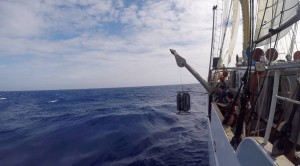
Deploying the carousel for collecting samples
Following the semester, I was provided the opportunity to come back to the McGuinness Institute and help with the ForesightNZ workshop. I listened to different presentations and perspectives addressing where the future of New Zealand was heading, and sat down with one of the groups discussing how certain trends and events would shape New Zealand’s future. I became increasingly aware that the trends and events identified as important to New Zealand’s youth were also trends and events that many American youths, including myself, would identify with as well. These included the need for a global response to climate change, ocean acidification, and increasing carbon emissions.
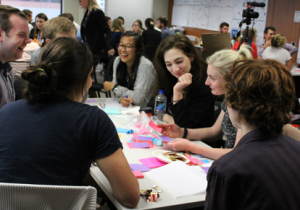
Hoai-Nam with a group of participants at the ForesightNZ workshop
Scientific research has informed us that sea levels are rising as global temperatures increase, ocean chemistry is being altered due to increasing carbon emissions, and marine ecosystems are threatened due to this changing chemistry and other anthropogenic causes. This has brought about the necessity of monitoring changes in ocean chemistry, biodiversity, and structure of marine ecosystems in order to monitor ocean health. The determination of ocean health is important as it not only plays a large role in the national and global economy, specifically in tourism and trade, but also acts as a global entity, one which creates and strengthens transnational ties. A healthy ocean also provides a sense of place, as well as acts to shape national identity. This sense of place and identity within New Zealand may be threatened in the face of climate change and warming temperatures as endemic marine species, such as the Hector dolphin, are increasingly at risk.
Through my experiences at sea and in Wellington with the ForesightNZ workshop, I have become increasingly aware of the need for the creation of an Oceans Institution in New Zealand. I have learned that while the process behind public policy is incredibly complex, the decision-making process is enriched and aided by the blending of different ideas. An oceans institution will provide such a platform to bridge policy and scientific research together by creating a space that cultivates different perspectives and promotes community involvement. It will then allow for a translation of the science behind a changing ocean into policy, while also taking the economy, identity, and culture into account. Such an oceans institution will then act as a global example for the development of public policy in regards to ocean conservation and management.
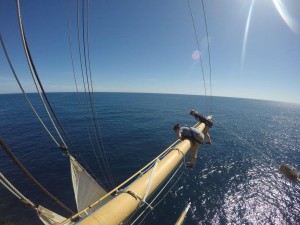
‘Greatness is not in where we stand, but in what direction we are moving. We must sail sometimes with the wind and sometimes against it – but sail we must and not drift, nor lie at anchor’.– Oliver Holmes

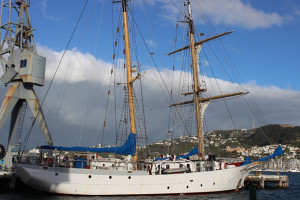
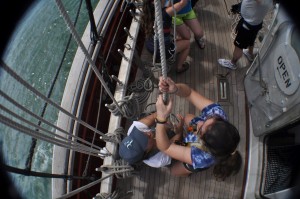
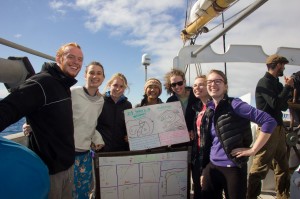





















![20160906 McGuinness Institute - TacklingPovertyNZ Workshop – Far North Flyer [FINAL]](/wp-content/uploads/20160906-McGuinness-Institute-TacklingPovertyNZ-Workshop-%E2%80%93-Far-North-Flyer-FINAL-1-50x50.png)